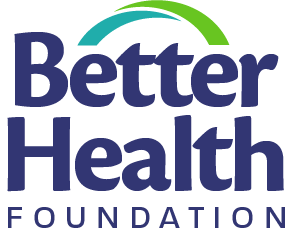GRANTS
Frequently Asked Questions
-
Better Health Foundation, established March 1, 2023, is an independent, private foundation.
-
Improvement in community health. Grants will be awarded for projects designed to improve health, prevent disease, and reduce health disparities.
-
While the priorities may shift and expand over time, current grantmaking priorities are:
• Mental and Behavioral Health
• Risk Reduction of Obesity and Diabetes
• Maternal and Child Health
-
501(c)3 organizations in the greater Quad Cities region encompassing Cedar, Clinton, Louisa, Muscatine and Scott counties in Iowa, and Henry, Mercer, Rock Island and Whiteside counties in Illinois.
-
Government agencies/units of government and public schools must partner with a 501(c)3 registered service providing organization to apply for funding, and it is the service provider that would be the grantee. As with all partnership proposals, the application must be accompanied by a signed MOU which specifies the role of the government/public organization, the level of resources to be transferred, and the specific work to be covered by those resources. The budget must mirror these conditions.
-
The Foundation awards grants by type over 3 competitive cycles. Requests begin with a Letter of Inquiry (LOI) submitted online at the Foundation’s grant portal.
• The (Fall) Capacity Building and Service Support grant cycle will open October 1, 2023. These awards are intended to improve the effectiveness and strengthen the operations and programs of our nonprofit partners.
• (Spring) Innovation grants are intended to bring new players, new methods, or new partnerships to community health priorities to improve community health results. The focus is on identifying and trying new ideas and new approaches inspired in the region or replicated from another area that experienced success.
• (Summer every 2 years) Solutions at Scale grants are intended to enable proven initiatives to be adopted throughout the region by a significant number of organizations serving a significant number of communities. The Foundation will be deeply involved in identifying and structuring these issues as a true substantive partner in the proposal process.
• (Rolling) Smaller discretionary grants will be considered out-of-cycle for emergencies that prevent the applicant from offering essential services. Applications will be required.
-
This varies by type and cycle, but the range begins at $10,000 for a Capacity Building and Service Support award and extends to as much as $350,000 for a Solutions at Scale award.
-
Grant seekers first submit a Letter of Inquiry (LOI) followed by a full proposal, if invited. The BHF Grant Review Committee reviews proposals and makes recommendations for awards to the BHF Board of Directors.
-
BHF does not consider proposals for the following:
• Individuals (e.g., travel, study, healthcare)
• Political campaigns or lobbying efforts
• Sponsorships or events
• Conferences and Convenings
• Endowments
• Capital campaigns
• Debt Reduction
• Exclusively religious purposes, although service-providing, faith-based organizations are welcome to apply regarding those service purposes
• Laboratory or clinical research or individual academic support (e.g., dissertation support)
• Pass through funds
• Competitor organizations to the Genesis, MercyOne, or Trinity (head quartered in Lavonia, MI) health systems
-
Genesis Health System contributed $40 million of its funds to seed the Better Health Foundation. The Board and GHS leadership wanted to establish a well-endowed, independent foundation that would be able to do significant work improving the health of the community.
-
Yes. BHF is unable to consider or award grants to organizations that compete, or appear to compete, with Genesis, MercyOne or its affiliates. This practice is in no way a reflection on the missions or people served by competing organizations; rather it is an acknowledgement that BHF exists as a legacy to Genesis.
-
Ensure requests meet the Foundation’s goals and guidelines, and address these important aspects:
• Evidence-based, both in identifying problems and proposing solutions
• Community engagement, true partnerships with the people the organization serves
• Sustainability, strategy to perpetuate the project or service beyond the grant
